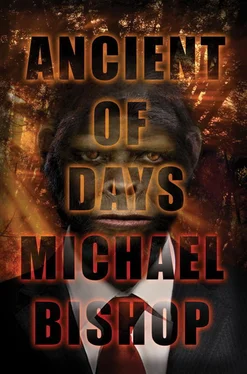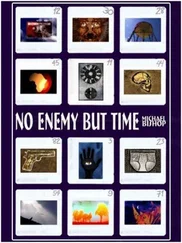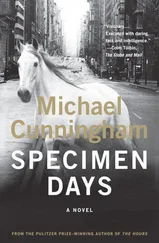Adam slumped into the chair at the desk. His voice, when he spoke, was a series of agonized croaks: “ I wish. Miss RuthClaire. Had let. McElroy. Baptize him .”
Adam decided to leave Emory Hospital. While I telephoned RuthClaire, he dressed, packed a suitcase, and faced down the bemused night nurse with a painful repetition of the words, “Goodbye, goodbye. Going now.” During this confrontation, he maintained the dignified decorum of a Japanese charge d’affaires. When I got off the phone, the nurse put through a hasty call to one of Adam’s doctors, who at first voiced angry opposition to our plans to decamp at this hour. Talking to me, though, he at last gave his reluctant consent, and the orderlies who had been summoned to keep Adam and me from hijacking an elevator to freedom backed off. The nurse then rode downstairs with us, reminding Adam to eat nothing chewier than oatmeal until Dr. Ruggiero had examined him again and noting that he would not be able to speak as well as he wished until he had undergone his scheduled speech therapy.
At the Montaraz house, only a few minutes later, RuthClaire ran to Adam and embraced him. I stood just inside the door connecting the kitchen to the big downstairs studio. The other three men present were Bilker Moody and the same pair of GBI agents who had driven RuthClaire and me back to the Snyder property on the day after our abduction from the West Bank: Niedrach and Davison. They wore nondescript business suits of flimsy black cotton, almost as if they had picked their outfits off the same rack. Davison, however, sported a beige Banlon shirt under his jacket, while Niedrach had made his own distinguishing fashion statement with a red clip-on tie and a red canvas belt on whose buckle shone the embossed head of the mascot of the University of Georgia, a bulldog wearing a freshman’s beanie.
Bilker’s opinion of the GBI agents revealed itself in the curl of his upper lip.
At last Adam and RuthClaire separated, and RuthClaire reintroduced everyone. I gave Niedrach the cassette on which I’d recorded Craig’s ransom demands. A tape player was produced, and the GBI men sat down to listen to the cassette. Bilker retreated to the bar, Adam paced, and RuthClaire perched on the arm of the divan beside Niedrach. I squatted opposite the divan on the other side of the marble coffee table.
“ We don’t want money. We don’t do violence. What we want is what’s right. You may think the brat’s been taken …” And so on, to the end.
Niedrach said, “That’s by far the craziest set of ransom demands I’ve ever heard.”
Sitting hunched on a high-gloss red bar stool, Bilker drawled, “The reason you’re dumfuzzled is that this ain’t a kidnapping anymore.”
Niedrach raised his eyebrows. “No? What is it, then? A dope deal?”
“A hostage situation.”
“Every kidnap victim is a hostage,” Niedrach countered with as much tact as he could muster. “That’s tautological.”
“Yeah. Logical ’cause you’ve been taught it. But a hostage situation’s different from a kidnappin’. Money ain’t the perpetrator’s number-one priority. It’s the pursuit of a far-out political or ideological goal by means of terroristic threats.”
“He told us they wouldn’t kill Paulie,” RuthClaire said.
Bilker revolved a half-turn this way, a half-turn the other. Because of his bulk, I half expected the legs of the stool to screw curls of hardwood up around themselves as they sank into the floor. “Yeah, well, Puddicombe’s cooler than any kidnapper ’cause the Great White Jehovah, Jumper of Jigaboos, is on his side. He’ll take more chances than a two-bit kidnapper. If you push him, he’ll raise the stakes.”
“The stakes he’s playing for are revenge,” I said.
“Mebbe so. But he gets it by makin’ us dance to his fiddlin’, not by crashin’ the Montarazes’ bank accounts.”
“So?” said Niedrach.
“We better dance to his fiddlin’. Or make it look like we are. Otherwise, he’ll—pardon me, Mrs. Montaraz—he’ll off his hostage.”
Davison said, “How do you know so much about it?”
“Mebbe I watch the CBS Evening News .”
Niedrach stood and pocketed his hands. “Mr. Moody’s pegged this exactly right. Now we know it’s a kidnapping—or a hostage situation involving a kidnap victim—the FBI will assume primary responsibility for the case. We’ve got to contact them.”
“But you and Mr. Davison have been through this with us before,” RuthClaire said. “The FBI won’t dump you fellows completely, will they?”
“I’ll try to make that point, Mrs. Montaraz, in telling them what’s happened so far. Meantime, though, Adam—Mr. Montaraz, I mean—should move out, to give every appearance of complying with the sickies’ demands. Mr. Moody’s right about that.”
Bilker grunted, startled to find an ally where he’d posited a bungling bureaucrat.
RuthClaire said, “I can’t believe Nancy’d let anything happen to Paulie.”
“Nancy may be in as much danger as your son,” Niedrach said.
And so it was decided that Adam would leave the house on Hurt Street. Niedrach would have a secretary at the state GBI offices telephone the Atlanta newspapers with an anonymous tip about the deteriorating marital situation of the Montarazes. She would claim to be a neighbor with firsthand knowledge of their troubles, including a confidence from RuthClaire that her husband had agreed to a trial separation requiring his immediate departure from the household. RuthClaire would grant the papers a tight-lipped interview omitting any mention of the abduction and confirming the anonymous friend’s separation story.
“But a separation on what grounds?” RuthClaire pleaded.
“Anything you can think of that doesn’t strike you as unseemly,” Niedrach said.
Adam tried to speak, but his gravelly computer voice would not cooperate, and he reverted to sign language. RuthClaire interpreted it for us. “Career incompatibility,” she said. “We’ve been arguing about Adam’s career plans. I want him to keep painting, but he wishes to enroll—” she struggled to read his gestures correctly— “in the Candler School of Theology at Emory. He wishes to take the curriculum leading to the Master of Theological Studies degree. I’ll tell the reporter that Adam has gone off the deep end on matters God-related.”
“That’s great,” Niedrach said. “That’s inspired.”
Davison grimaced. “A habiline religious nut?” Yes. Apparently so. The point of the ruse, of course, was to get word to Craig that RuthClaire and Adam had stopped living together. The story’s appearance in print would insure its finding its way onto local TV news broadcasts, where Craig could monitor recent muggings, rapes, street-name changes, city-council shouting matches, and mayoral trips overseas.
“What’s the chance of the media catchin’ wind of the kidnappin’ itself?” Bilker asked.
“Dust-ups at Sinusoid Disturbances are a regular thing,” Davison replied. “We’re in the clear for now.”
Niedrach said, “Puddicombe may break the news himself. Publicity doesn’t worry him. He might even like it. So if the story leaks, Paulie won’t be in any more—or any less—danger than he already is.”
Where was Adam going to move to? We mulled the options. He needed a shelter offering privacy as well as a certain remoteness from the urban bustle of Atlanta. What qualified? A rented house in Alpharetta? A lakeside cottage in Cherokee County? The monastery in Conyers?
“Let him come to Paradise Farm with me,” I suggested.
RuthClaire said, “Wouldn’t Craig look askance at that? You’re my ex-husband. You’re also Paulie’s godfather.”
“Two castoffs commiserating,” I said. “It’s honky-on-hibber marriage that upsets Puddicombe, not white and black males cohabiting.”
Читать дальше












